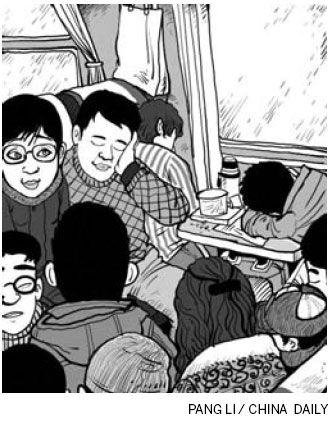
At 12:37 pm, the elegant and futuristic-looking bullet train zips out of Jiaxing station.
It departs from the familiar scenes of cute little houses dotting the vast farmland and boats heaving with cargo as they float along the Grand Canal's many branches.
After six hours of comfortable riding, I will be back in the bustling and vibrant city of Beijing, refreshed and re-energized after 10 days of Spring Festival holiday.
My hometown, Jiaxing - a small town near Zhejiang's provincial capital Hangzhou - was weeks from Beijing by boat along the Grand Canal 700 years ago. And it was 24 hours by train when I was in college 25 years ago. Now, it's only six hours by high-speed train.
While I am enjoying my six-hour ride, equipped with my iPod, iPad and BlackBerry, I'm not sure how ancient people endured weeks on the boat.
The period's paintings and novels suggest they enjoyed it. Towns and cities boomed along the waterway, offering abundant food, liquor and entertainment.
However, the 24-hour train rides of my college years were far from comfortable, especially one trip just before the Chinese New Year, which I still vividly recall.
Although Beijing Railway Station was one of the biggest and best in the country, its splendor was lost in the crush and cacophony of crowds.
Getting into the station was a fight against waves of people and their luggage (mostly huge plastic bags or cloth wrapped tightly by ropes). I was almost pushed over several times but was held upright by the crowd in which I was smashed.
The train, however, was reasonably orderly. Well, at least it was when it departed from Beijing.
After it stopped in Hebei province's Langfang, Tianjin, and Hebei's Cangzhou, passengers squished onboard with even bigger pieces of luggage. The aisles started to fill up. People started to edge over and sit on the inches of space left on the edges of the compact three-person seats.
By midnight, I had to literally walk on people's shoulders to reach the bathroom at the end of the compartment. Worse yet, the bathroom was surrounded by people, who found "comfortable" space there. I returned to my three-person seat, into which five people squeezed.
The small window at one of the very few ticket offices around Beijing opened at 8 am, five days before the trip - the maximum number of days before the departure date that tickets could be purchased.
My husband - then my boyfriend - got the last two tickets with seats to Jiaxing. We felt like we had won the lottery.
He had walked into the freezing Beijing night 12 hours earlier, with a newspaper and small foldable stool in his warm jundayi (army overcoat) to get the tickets for his girlfriend.
A contemporary equivalent to the line that formed would be that for the latest iPhone at Sanlitun's Apple store.
As these scenes from the past race through my mind, the electronic board above indicates the train is slowing.
After a few mouse clicks and six hours of comfortable travel, I'm back in Beijing.
While high-speed trains have yet to come to many places, where people must still line up overnight, the feeling of returning home is the same - whether it's to your hometown or to the city in which you live.
|
|
|
|
|
|
|
|
